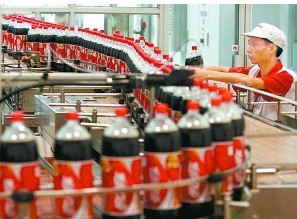Coca-Cola Co, the world's largest beverage maker, will focus on organic growth for its juice business in the country and focus on its own juice brand, Minute Maid, a top executive said Wednesday.
The company is not considering any acquisition in the juice sector after the Chinese government rejected its $2.4-billion bid for Huiyuan Juice recently, said Doug Jackson, Coca-Cola's president for China, during the opening ceremony of a new bottling plant in northwestern China.

Jackson also said Coke had no plans to list on China's stock exchange, dismissing an earlier research note by UBS AG, which reported that the company might seek to list in the yuan-denominated A-share market.
Coke and COFCO Coca-Cola Beverages Ltd, a joint venture with China's largest agriculture product enterprise COFCO, have invested more than 110 million yuan for the bottling facility in Urumqi, the capital of the Xinjiang Uygur autonomous region.
The plant is expected to churn out 500 million bottles of Coke products each year, and help it better tap the demand of the 20 million consumers in the western region.
On Tuesday, the company opened another bottling plant in Nanchang, the capital of Jiangxi province. The 100-million yuan investment there is expected to help the company gain better access to the 44 million consumers in this eastern province of China.
Both investments are part of the beverage maker's three-year plan of investing $2 billion in China to expand its manufacturing and marketing activities. That's more than its $1.6 billion total investment in China over the past 30 years.
Coca-Cola is accelerating its expansion in the world's most populous nation.
"China has the potential to become our largest market in the world," Jackson said.
China overtook Mexico to become the third largest market for Coke in 2008, but the company said Chinese consumers only drink 25 bottles of its products per person each year, compared with 500 in the US.
Jackson estimated that there would be another 300 million urban residents in China by 2020, about the current population of the US. That could be a "big opportunity" for the US soft drinks maker, he said.
The company's sales in China grew 10 percent in the first quarter this year, even as global sales only expanded by 2 percent during the period.
In March, the Chinese government rejected Coke's bid to acquire 100 percent of Huiyuan Juice Group, a local juice maker, citing concerns over market monopoly.
Huiyuan is the dominant player in China's growing juice market, holding more than 40 percent of the share in terms of sales revenue. Coke also faces fierce competition from local players such as Wang Lao Ji, a domestic herbal teamaker, in the non-sparkling beverage market.
Coke now holds about half of the Chinese market for carbonated beverages but it has also been expanding the faster-growing juice business, as younger Chinese consumers are willing to pay more for healthy juice beverages.
The failure of the deal, which could have been the largest foreign acquisition of a Chinese company, was a serious setback for Coke as the juice business already accounts for 10 percent to 20 percent of its total China sales.
(China Daily June 25, 2009)